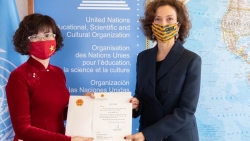
Bologna process – History and current Goals
Latest
 |
| In the field of education, with the aim of internationalization, countries in the region of Europe have joined hand in creating an uniformity from education system, recognition and accreditation process between countries. (Source: Vtcorp) |
The birth of the European Union has marked a major turning point in the development of the old continent in every field, from economy to education. Especially in the field of education, with the aim of internationalization, countries in the region have joined hand in creating an uniformity from education system, recognition and accreditation process between countries.
Following the previous articles under the Recoasia project, in this issue, the research team will highlight the history and most important features of the Bologna Process - the ministerial agreement on education reform between European member countries. With this topic, the research team has consulted the expertise of Professor, Dr. Marco Abbiati, Scientific Attaché, Embassy of Italy in Ha Noi.
What is Bologna Process?
Bologna Process or Bologna Declaration is a serial of ministerial meetings and agreements from 1999 to ensure the assessment capability, unify criteria and quality of higher education and post-graduate education among European countries. This process is the result of cooperation among 48 European countries, the European Commission, a large number of professional advisory members, government representatives, higher education institutions, quality assurance organizations and international authorities as well as interested parties.
Goals
The most important goal of the process is to create European Higher Education Area and enhance competitiveness of European Education on the global stage. Since the first Bologna Declaration in 1999, the process has set various goals like: introducing a clear qualifications recognition system through the application of the Appendix; a consistency in an ECTS based system in different sectors; removed various barriers for the exchange of students, teachers, researchers and technicians; and strengthen cooperation in Europe on quality assessment, development of training and research programs.
48 countries have participated in the process, each with different role. The leading role is the Progress Monitoring Groups comprising of representatives from the participating countries and the European Commission. Meanwhile the advisory role is taken care by EI –Education International, ENQA – European Association for Quality Assurance in Higher Education, ESU – European Students’ Union, EURASHI: Non-University Higher Education in Europe, EUA – European Universities Association, UNESCO and Business Europe. The participation process of the members is as follows:
-
1999: Austria, Poland, Belgium, Portugal, Bulgaria, Czech Republic, Denmark, Germany, Estonia, the Netherlands, Hungary, Greece, Iceland, Ireland, Italy, Latvia, Lithuania, Luxemburg, Malta, Norway, Finland, France, Romania, Slovakia Republic, Slovenia, Spain, Sweden, Switzerland, England
-
2001: Cyprus, Croatia, Liechtenstein, Turkey
-
2003: Albania, Bosnia and Herzegovina, former Republic of Macedonia, Russia, Serbia, the Vatican
-
2005: Armenia, Azerbaijan, Georgia, Moldova, Ukraine
-
2007: Mintenegro
-
2010: Kazakhstan
-
2015: Belarus
Implementation level:
- International level: operated through biannual meetings of Education Ministers, along with biennial interim meetings of the Progress Monitoring Group and seminars called “Bologna” at different EU countries which aim to assess actions taken, determine and resolve existing problems and propose new forms of actions.
- National level: the composition is the Minister of Education, the Rector Association, other educational associations, student unions, quality assurance agencies, possibly including the Business Association with the goal of innovating the structure, qualifications, program organization, introduce the EU credit system, promote student exchange, lecturer and staff.
- University level: with the participation of the Department, Faculty, the Board and other organizations under the role of the direct teaching team, people who are responsible for the application of EU principles at University level.
Conferences and specific goals of each conferences
Ministerial conference Prague (2001): set new goals, roles of educating institutions and students in pursuit of common goals of the process; reaffirming the social scale of the process as well as two principle of higher education: public interest and public responsibility.
Ministerial conference Berlin (2003): adding another important aim related to researching sector: third cycle – PhD and confirming criteria on the 2 cycles system, assuring quality; recognition of qualifications and next education phases are to be postponed until the next conference in Bergen. In order to achieve these aims, the Bologna Tracking Team was commissioned to perform a comparative analysis of the results obtained in three different areas from individually participated countries and then conduct an in-depth research on two topics: General criteria and guidelines and quality assurance guidelines with support from ENQA (The European Association for Quality Assurance); and European reference framework for academic level - based on workload, qualifications, academic performance, skills and career profiles.
Bergen Conference (2005): The Ministers prioritize the targets for the 2005-2007 period related to the link between training and research, doctoral training; the social scale of the Bologna process; exchange of students and faculty in member countries; relations between the European Higher Education Area and other non-European countries.
London Conference (2007): Ministers focus on the accreditation of qualifications through analysis of the ENIC-NARIC network, action plans for the recognition of equivalent qualifications; cooperation among European countries on quality assurance through the establishment of a registration office for quality assessment bodies (established in 2008); adopting a strategy prepared by the Monitoring Group to expand the educational model of the European region to the world.
Leuven Conference (2009): Ministers prioritize the discussion of students and teachers exchange, with the target set by 2020, the number of exchanged graduates must reach 20%; defining lifelong learning goals, especially associated with research and innovation, fully implementing the cycle reforms at University level and the concentration of the social scale. The Ministers had also agreed on the necessity to promote better cooperation after 2010, postpone the consideration of emerging challenges until the next meeting and on the opportunity to host an anniversary event in the EU region in 2010.
With information on the history of the Bologna Process and its future goals, the authors hope that readers will have a better understanding of the characteristics and how the educational systems of European Member Countries work.

| Vietnam’s practical contributions to UNESCO praised UNESCO Director General Audrey Azoulay has expressed her appreciation for Vietnam’s practical contributions to UNESCO’s important issues, thus helping fulfill the overall mission of the ... |

| Information on Italian art and music higher education system TGVN. When it comes to beautiful Italy, world-famous architecture and fashion immediately comes to mind, as well as interior design, music and especially Opera. Currently, ... |

| Information on European qualifications – Things you need to know The research team under the RecoAsia project will clearly present the basic information on the qualifications and their value to help students and agencies operating ... |


















